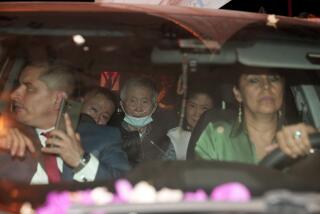Family and Friends Are Also Held Hostage by Peru Crisis
- Share via
LIMA, Peru — Lucy Napuri was glowing with a mother’s pride as she bounded into the grocery store. Waiting in the car was her son Sergio, fresh from his high school graduation. Her other son, Jerico, was at a glittering party at the Japanese ambassador’s house--another honor atop a trip he won to Tokyo for being an outstanding youth.
It was one of her happiest days, she was thinking. Then she was stopped cold. There, on the store television, was the ambassador’s residence, seized by gun-wielding guerrillas. Hundreds of guests were hostages, the TV announcer said breathlessly. They included her 20-year-old son.
“I wanted to scream!” she recalled.
So began the grueling ordeal for Napuri and hundreds of other relatives and friends of those held by the guerrillas. Sleeping in cars near the ambassador’s residence, staring for hours at the TV, they have become hostages to the hostage crisis that continued its excruciating stalemate Thursday, when the guerrillas allowed food and medical care in and freed a few more captives.
Meantime, though, the siege played havoc with the lives of the spouses and children of foreign ambassadors, prominent academics, even a terrorism expert. Seized at the ambassador’s residence Tuesday night was a virtual Who’s Who of Peru, including Cabinet officials, top police officials, Supreme Court judges and President Alberto Fujimori’s brother, Pedro. (The gunman earlier released Fujimori’s mother and sister.)
“It’s been really ugly,” said a bag-eyed Chantal Toledo, 14, daughter of former presidential candidate Alejandro Toledo, as she tried Thursday to persuade police near the diplomatic residence to pass along her father’s stomach medicine.
Even after glimpsing the rebel attack on TV, Napuri, a Lima homemaker, had no idea of the nightmare that was dawning. After all, her son, a university student, was a Boy Scout leader.
He and 11 other young people at the ambassador’s party were celebrating the free trips they had just won to Tokyo, part of a Japanese government program to recognize young achievers.
“I came down here thinking that, since he was young and had nothing to do with politics, they’d let him go,” said Napuri, 41, lighting another Marlboro as she sat on a curb near the ambassador’s residence, waiting and waiting.
But it was only the beginning of the most nerve-jangling period of her life.
Initially, Napuri did not call her husband, Roberto, employed at a mining camp about 300 miles from Lima. He thought that his son Jerico would be spending the evening at his brother’s high school graduation.
But Jerico had decided to attend the Japanese party after embassy officials had called, asking if he could also bring photos for his visa to the event. Jerico was “full of dreams” about his trip to Japan in January, his mother said.
She pressed her lips together in an effort to keep back the tears.
“The last thing I remember is fixing his tie,” she said softly.
That first night her son was hostage, Napuri recalled, she wandered, dazed, among the TV cameras packed behind a police line about a block from the sprawling, white-walled residence. One reporter had a telephone line open to the besieged compound. Napuri listened hungrily for details.
The guerrillas, from the left-wing Tupac Amaru Revolutionary Movement, released the six young women who were with Jerico’s group that night. But they continued to detain the young men.
Exhausted, Napuri finally dozed in her Nissan pickup truck, one of several relatives who have camped out near the ambassador’s residence.
“Imagine, passing the night in the street, in the cold. Your body just aches,” she said.
The next morning, she again prowled among the journalists, seeking information. Determined not to leave, she used the bathroom and phone of one of the Japanese ambassador’s neighbors. It was only at 2 a.m., after negotiators announced the suspension of talks for the night, that she went home.
On Thursday morning, freshly showered and in a crisp white shirt and blue jeans, Napuri was again keeping her vigil near the TV journalists. At her side, her son Sergio clutched a yellow plastic radio. They were armed with blankets and thick socks, ready to spend another night in the street.
But reporters were receiving few details of the negotiations, and Napuri was beginning to look worried. Other hostages’ family members had grown desperate, some appealing to their relatives in tearful messages broadcast on TV.
“While we had communication [with the ambassador’s residence] through the press, I kept my hope and faith in God,” Napuri said. “What worries us is the silence.”
More to Read
Sign up for Essential California
The most important California stories and recommendations in your inbox every morning.
You may occasionally receive promotional content from the Los Angeles Times.













